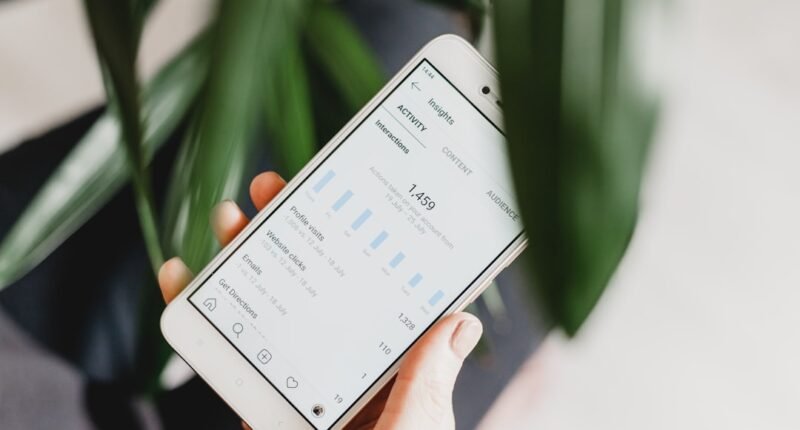Influencer marketing has become a crucial component of the marketing environment in the current digital era. Businesses are realizing the value of working with influencers to reach their target audience as a result of the growth of social media platforms and the rising influence of online personalities. This post will examine influencer marketing, including its advantages for companies and the significance of monitoring campaigns. Influencer marketing is a type of advertising in which a company collaborates with well-known people, or “influencers,” to promote a product, service, or brand.
Key Takeaways
- Influencer marketing is a popular marketing strategy that involves partnering with individuals who have a large following on social media.
- Tracking influencer marketing is important because it allows businesses to measure the success of their campaigns and make data-driven decisions.
- Building an influencers database involves identifying individuals who are relevant to your brand and have a large following on social media.
- Identifying influencers’ email addresses is crucial for reaching out to them and building a relationship.
- Crafting effective email templates for influencers is important for getting their attention and building a successful partnership.
Known as authorities or trendsetters in their respective fields, these social media influencers enjoy a sizable fan base. Enterprises can efficiently connect and interact with their intended audience by capitalizing on the credibility and trust that influencers have established with their following. The capacity to produce relatable & genuine content is one of influencer marketing’s main benefits. Influencer marketing, as opposed to traditional advertising, enables brands to interact with customers in a more sincere & natural way.
Through partnering with influencers who share their brand values and target demographic, companies can produce content that connects with consumers & encourages deep engagement. It’s critical to monitor influencer marketing efforts for a number of reasons. First of all, it enables companies to assess the performance and efficacy of their advertising campaigns. Businesses can evaluate the return on investment (ROI) of their influencer marketing campaigns & devise data-driven campaign strategy by monitoring critical performance indicators like engagement, reach, and conversions.
Secondly, companies can determine which influencers are adding the most value to their brand by monitoring influencer marketing campaigns. Through the analysis of influencer performance, businesses can enhance their collaborations and more efficiently deploy their resources. By using a data-driven strategy, companies can be sure that the influencers they are funding are producing the best outcomes.
| Metrics | Data |
|---|---|
| Number of Influencers | 25 |
| Average Engagement Rate | 4.5% |
| Total Reach | 1.2 million |
| Number of Posts | 50 |
| Cost per Post | 500 |
| Total Cost | 25,000 |
Tracking influencer marketing campaigns, though, can be difficult. Influencer marketing functions in a less centralized and more dispersed environment than traditional advertising channels. Since every influencer has a distinct audience and set of engagement metrics, comparing and evaluating the performance of various campaigns is challenging. Influencer marketing also frequently incorporates non-traditional content types, which can be more difficult to monitor & quantify, like sponsored posts and product placements. Businesses must first create a database of possible influencers in order to track influencer marketing campaigns efficiently.
Finding influencers who share their values, target market, and marketing goals is part of this process. One can create an influencer database in a few different ways:1. Researching relevant hashtags, keywords, or topics on social media platforms can be a good place for businesses to start. Businesses can find influencers with a strong following in their sector or niche by looking through the content and interactions of various influencers. 2.
Platforms for influencer marketing: A plethora of platforms exist that facilitate the connection between influencers and brands. Businesses can use these platforms to search & filter influencers based on particular parameters like audience demographics, engagement rates, or content categories. They also give businesses access to a database of influencers. Three. Recommendations and referrals: Companies can also use their current industry contacts or network to find possible influencers.
Businesses can find influencers who have previously been screened & recommended by others by requesting referrals or recommendations from reliable sources. Both the quantity and caliber of an influencer’s engagement should be taken into account when creating an influencer database. An influencer with a smaller but more devoted fan base might be worth more than someone with a bigger but less involved following.
To preserve authenticity & trustworthiness, it’s also essential to make sure the influencers share the values of the brand and your target market. Contacting possible influencers is the next step for businesses after they have been identified. Email is one of the best methods to get in touch with influencers.
However, since many influencers prefer to keep their contact information private, it can be difficult to find their email addresses. The following techniques can be used to obtain influencers’ email addresses:1. Forms for businesses to submit inquiries or requests for collaboration can be found on the websites or blogs of many influencers. Influencers can reply directly to these forms by email, but frequently businesses must supply their own contact details. 2.
Social media profiles: Some influencers might have their email addresses listed in their bios or profiles on social media. Businesses can find out if influencers have shared their email addresses by looking through the “About” or “Contact” sections of their profiles. 3. Sending influencers a direct message on social media platforms is another way for businesses to get in touch with them.
Even though this approach might not always work, it might be worthwhile to try, particularly with smaller influencers who might be easier to reach. It’s crucial to take a customized approach when emailing influencers. Emails that are generic or sent in bulk are probably going to be deleted or ignored. Rather than rushing into outreach emails, companies ought to take the time to learn about the influencer and their content. Forging a sincere bond with influencers and raising the likelihood of a favorable reaction, personalization and customization are essential.
The key to creating fruitful collaborations is crafting persuasive outreach emails for influencers. The following are some pointers for crafting intriguing and captivating outreach emails:1. Customize the email by addressing the influencer by name at the outset and bringing up a particular topic or recent post of theirs. This demonstrates your diligence in reading up on & comprehending their work. 2. Be succinct and clear: Write a brief and direct email.
Influencers are frequently approached for collaboration, so it’s critical to catch their eye right away. Emphasize what you are offering or proposing in the email, along with its purpose. Three. Emphasize the advantages: Describe the ways in which an influencer’s partnership with your brand will benefit them.
Make sure you convey the value proposition clearly, regardless of the incentive—access to special goods or events, exposure to a new audience, or monetary compensation. 4. Provide influencers with options for customization: Allow influencers to alter the partnership to suit their audience and style. This demonstrates your appreciation for their original ideas and your receptivity to them. 5. Observation: Do not lose hope if you do not hear back from your first email correspondence. Because influencers are busy people, it’s possible that your email ended up in the wrong inbox. You can improve your chances of receiving a response by sending a courteous follow-up email a few days later.
For influencer marketing to be successful over the long run, relationships with influencers must be cultivated. Influencer partnerships should be seen as cooperative efforts rather than one-time deals. Businesses can build trust and loyalty with influencers and produce more impactful and authentic content by cultivating these relationships and offering influencers continuous support & value. Reaching out to influencers requires personalization, but having a well-written email template can save time and guarantee consistency in your outreach.
The following email templates are examples of successful outreach to influencers: Template 1: Introduction and Collaboration Proposal Subject: Collaboration Opportunity with [Brand Name] Hello [Influencer’s Name], I hope this email finds you well. [Your Name] here, and I’m contacting you on behalf of [Brand Name]. I’ve been keeping up with your work on [Social Media Platform] and I’m impressed with the quality of your content and audience interaction. For a future campaign promoting our new [Product/Service], we are currently seeking influencers to work with.
We think our brand would look fantastic with your distinct style and level of experience. We would be delighted to talk about the potential for collaboration and investigate how we can produce interesting, real content that appeals to your readership. I would be pleased to answer any questions you may have and provide further information about the campaign if you are interested. We would be happy to hear your suggestions and are open to customization. awaiting your response with interest. Warm regards, [Your Name]Template 2: Follow-up EmailSubject: A Friendly Reminder About a Potential Collaboration with [Brand Name]Hello, [Influencer’s Name], I hope all is well with you.
About our possible partnership, I wanted to inquire further about my prior email to [Brand Name]. I wanted to make sure my message didn’t get lost because I know you’re busy and may have a lot of emails in your inbox. We are incredibly excited about the prospect of collaborating with you and are confident that your special insight and knowledge would be extremely helpful to our campaign. Please do not hesitate to contact us if you have any questions or would like further information. awaiting your response with interest.
Regards, [Your Name] It is crucial to remember that these templates should only be used as a guide and should be altered to match the particular influencer & campaign. Forging a sincere bond with influencers and raising the likelihood of a favorable reaction, personalization and customization are essential. Measuring the effectiveness of influencer marketing campaigns requires tracking influencer engagement and return on investment. The following techniques can be used to monitor ROI & influencer engagement:1.
Trackable links: Give influencers exclusive codes or links that can be tracked so they can distribute them to their audience. Businesses can determine the exact effect that influencer partnerships have on their website or sales by tracking the traffic and conversions that come from these connections. 2. Social media analytics: Businesses can use the data and insights offered by the majority of social media platforms to monitor the effectiveness of their influencer partnerships.
Metrics like follower growth, engagement, impressions, & reach can give important information about how successful influencer marketing campaigns are. 3. UTM parameters: Track traffic and conversions from various campaigns and platforms by using UTM parameters in the URLs that influencers share. As a result, companies can measure the influencer partnerships’ overall impact on marketing initiatives and credit particular actions or conversions to them. 4. Surveys and feedback: Get influencers’ opinions about their interactions with your brand.
This can give you important information about how successful your influencer marketing campaigns are as well as point out areas that need work. Tracking and evaluating the success of influencer marketing campaigns requires the establishment of precise goals and KPIs. Businesses should establish clear goals and metrics to assess the effectiveness of their influencer partnerships, regardless of the end goal—boosting sales, expanding brand recognition, or increasing website traffic. Analyzing numerous metrics and data points is necessary to determine the effectiveness of influencer marketing campaigns.
The following metrics can be used to assess an influencer marketing campaign’s effectiveness:1. Reach and impressions: Calculate the quantity of individuals who have encountered your brand or content as a result of working with influencers. Influencers’ reach metrics or social media analytics can be used to monitor this. 2. Engagement: Track the quantity of likes, comments, shares, and saves that result from influencer partnerships. A high level of engagement suggests that the audience connected with the content and had meaningful interactions as a result. 3.
Sales and conversions: Keep track of how many sales or conversions are brought about by working with influencers. Trackable links, coupon codes, and other conversion tracking techniques can be used to achieve this. 4. Brand sentiment: Keep an eye on how the public views and feels about your brand when it comes to influencer partnerships. This can be accomplished by examining audience comments and feedback or by using social listening tools. 5. Follower growth: Calculate how much your social media following has grown as a consequence of working with influencers.
This illustrates how influencer collaborations affect the reach and visibility of your business. It is crucial to remember that quantitative metrics are not the only way to assess the effectiveness of influencer marketing campaigns. The success of influencer partnerships should also take into account qualitative aspects like brand alignment, authenticity, & the overall effect on brand perception.
In today’s digital marketing environment, influencer marketing is a crucial element. Businesses may successfully connect and interact with their target audience in a more genuine and approachable manner by forming partnerships with prominent people. To measure success, optimize partnerships, and make data-driven decisions, however, influencer marketing campaign tracking is essential.
The success of influencer marketing will depend even more on tracking as it develops. Businesses will have access to increasingly advanced tracking tools & metrics as a result of technological & data analytics advancements. They will be able to improve their strategies and obtain a deeper understanding of the efficacy of influencer partnerships as a result.
In summary, influencer marketing is an effective strategy that helps companies engage with their target market & generate deep engagement. Businesses can make the most of their influencer partnerships and accomplish their marketing goals by compiling an influencer database, contacting influencers via email, and monitoring the effectiveness of influencer marketing campaigns. Tracking will be essential to influencer marketing’s ongoing success as the industry changes.
If you’re wondering how to effectively track influencer marketing campaigns, look no further. In a recent article by Influencers.email, they provide valuable insights and tips on how to monitor and measure the success of your influencer collaborations. From setting clear goals to utilizing tracking tools, this article offers a comprehensive guide to ensure you get the most out of your influencer partnerships. Check out their article here for expert advice on tracking influencer marketing and maximizing your ROI.
FAQs
What is influencer marketing?
Influencer marketing is a type of marketing that involves partnering with individuals who have a large following on social media to promote a product or service.
Why is tracking influencer marketing important?
Tracking influencer marketing is important because it allows businesses to measure the effectiveness of their campaigns and determine the return on investment (ROI).
What are some metrics used to track influencer marketing?
Metrics used to track influencer marketing include engagement rate, reach, impressions, clicks, conversions, and sales.
How can businesses track influencer marketing?
Businesses can track influencer marketing by using tools such as Google Analytics, social media analytics, and influencer marketing platforms that provide data on campaign performance.
What are some challenges of tracking influencer marketing?
Challenges of tracking influencer marketing include the difficulty of measuring the impact of influencer content on sales, the lack of standardization in influencer marketing metrics, and the potential for fraudulent activity such as fake followers and engagement.
What are some best practices for tracking influencer marketing?
Best practices for tracking influencer marketing include setting clear campaign goals, establishing key performance indicators (KPIs), using tracking links and unique promo codes, and regularly analyzing and optimizing campaign performance.






